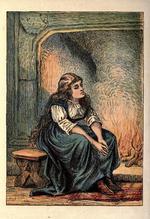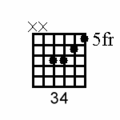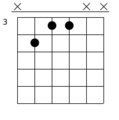This is an old revision of this page, as edited by InternetArchiveBot (talk | contribs) at 20:32, 30 May 2017 (Notification of altered sources needing review #IABot (v1.3.2.4)). The present address (URL) is a permanent link to this revision, which may differ significantly from the current revision.
Revision as of 20:32, 30 May 2017 by InternetArchiveBot (talk | contribs) (Notification of altered sources needing review #IABot (v1.3.2.4))(diff) ← Previous revision | Latest revision (diff) | Newer revision → (diff)| Major thirds tuning has been listed as one of the Music good articles under the good article criteria. If you can improve it further, please do so. If it no longer meets these criteria, you can reassess it. | ||||||||||
| ||||||||||
| A fact from this article appeared on Misplaced Pages's Main Page in the "Did you know?" column on June 30, 2012.The text of the entry was: Did you know ... that the Russian guitar's D-G-B-D-G-B-D tuning (illustrated) approximates the major-thirds tuning D♯-G-B-D♯-G-B-D♯? | ||||||||||
| This article has not yet been rated on Misplaced Pages's content assessment scale. It is of interest to the following WikiProjects: | ||||||||||||||||||||||||||||
Please add the quality rating to the {{WikiProject banner shell}} template instead of this project banner. See WP:PIQA for details.
{{WikiProject banner shell}} template instead of this project banner. See WP:PIQA for details.
{{WikiProject banner shell}} template instead of this project banner. See WP:PIQA for details.
| ||||||||||||||||||||||||||||
| This article is written in American English, which has its own spelling conventions (color, defense, traveled) and some terms that are used in it may be different or absent from other varieties of English. According to the relevant style guide, this should not be changed without broad consensus. |
Requested move
| Resolved |
|---|
| The following discussion has been closed. Please do not modify it. |
The result of the move request was: Moved early per primary editor's request. SarekOfVulcan (talk) 03:41, 19 June 2012 (UTC)
|
Template:Did you know nominations/Major thirds tuning
The DYK nomination still needs to be reviewed.
Thanks! Kiefer.Wolfowitz 17:11, 25 June 2012 (UTC)
- Thanks to the reviewers. The hook appeared, and is recorded
at the top of this pagenext. Kiefer.Wolfowitz 12:16, 24 July 2012 (UTC)
- Thanks to the reviewers. The hook appeared, and is recorded
"Major thirds tuning" or "Major-thirds tuning"?
The article is titled "major third tuning" but the introduction reads "major-thirds tuning". Which one should it be? Hyacinth (talk) 09:43, 24 July 2012 (UTC)
- Major-thirds tuning > major thirds tuning
- The adjective "major" modifies the noun "thirds". The modifier "major-third" modifies "tuning". WP:MOS and standard English suggest that the hyphen prevents ambiguity, particularly the mis-reading that "major" and "thirds" separately modify the noun "tuning".
- I assume that Sarek chose the non-hyphenated form for simplicity. Kiefer.Wolfowitz 12:16, 24 July 2012 (UTC)
Chord diagrams
| The following discussion has been closed. Please do not modify it. |
|
I'm going to deposit some files from the Wikimedia foundation here. These can be used for major-thirds exposition. My labeling assumes the (low)
tuning, to avoid the D#. Would that some angel redraw them for consistency! Kiefer.Wolfowitz 00:20, 20 August 2012 (UTC) Thanks Kiefer for your comment on my page, you encouraged me to lift it up a bit! I deposited 2 files as requested: I used TuxGuitar to create them. Cheers --Alexandre Oberlin (talk) 13:08, 23 August 2012 (UTC)
LaTeX and PDF
It is possible to import images form pdf files. I quote from Misplaced Pages's tutorial on images: 
Thus, it seems simplest for me to create one PDF file with the images alone on individual pages. Kiefer.Wolfowitz 13:56, 25 August 2012 (UTC) GIMPIt was easy to export snapshots from PDF to PNG format, using the open-source GIMP software. Kiefer.Wolfowitz 17:26, 26 August 2012 (UTC) |
Gauges for strings
I record suggested string gauges, two by reliable sources (and one by me, trivially calculating the correct tensions for my Ovation's recommendations for lightest strings), (c.f. a blog and D'Addario).
| Major-thirds tuning (M3) | G♯=A♭ | E | C | G♯=A♭ | E | C | G♯=A♭ | E | C |
|---|---|---|---|---|---|---|---|---|---|
| M3 Ralph Patt (24 5/8 inches) | .007-8 | .010 | .013p | .022w | .026w | .032w | .042w | .052 | |
| M3 Ole Kirkeby (round wound) (25.5 inches) | .010p | .013p | .020w | .028w | .036w | .044w | .052w | ||
| M3 KW (Light, 25.25 inches) | .008-9 | .010p | .0135p | .022w | .028w | .035w | .044w | .055-.056w | 0.052-0.60 (or 0.064 by calculator) |
| Gypsy tuning | ? | ? | ? | ? | ? | ? | ? | ? | |
| Gypsy light | .010p | .014p | .023w | .026w | .034w | .044w | |||
| Gypsy medium | .011p | .015p | .024w | .028w | .035w | .045w | |||
| Open-G DBG-DBG-D | D | B | G | D | B | G | D | ||
| Russian 7-string | .012 | .014 | .019 | .024 | .030 | .039 | .051 |
- Usually 24 5/8 inches; sometimes 24 1/8 or 23 9/16 (Peterson, 2002, p. 43).
- ^ D'Addario
- ^ Elixer Nanoweb, e.g. Custom Lights
- This is good information, and I suggest that this chart, or a variation thereof, be included in the article.
- I will point out that 7-string "open G tuning", "Russian guitar tuning", and "gypsy tuning" are identical -- they're three different names for the same thing. From low to high: D2, G2, B2, D3, G3, B3, D4.
- Also, that string-instrument tunings, and string gauges, are most commonly given from low-pitched string to high-pitched string, a convention which is followed in most Misplaced Pages articles on stringed instruments -- you have these reversed in the chart.
- 74.95.43.249 (talk) 19:53, 29 September 2016 (UTC)
Gypsy-strings?
Can anybody explain why "Gypsy strings" (from e.g. D'Addario) suit major-thirds tuning?
(The Russian guitar's open-G tuning is major-thirds "on average", and so I list its gauges. It may sometimes be called a gypsy tuning. Is it related to Django's?)
Kiefer.Wolfowitz 22:13, 1 November 2012 (UTC)
Good article
{{GA|05:55, 28 January 2013 (UTC)}}
Reliable sources
Misplaced Pages is not a forum. Discussions of M3 tuning that are not focused on improving this article may occur at a jazz-guitarist newsgroup:
While not reliable source, its discussions mentioned this article, and so may suggest ideas for improvements. Its discussions also mention reliable sources.
Thanks! Kiefer.Wolfowitz 10:00, 28 April 2013 (UTC)
Needs Balance
This is an interesting and informative article, but it only mentions the presumed advantages of playing in major-thirds tuning. It would be more encyclopedic to also make some mention of the disadvantages of the tuning. For example,
- M3 tuning decreases the overall range of the guitar (this is why Patt eventually resorted to 7- and 8- string instruments, to regain that lost range)
- M3 simplifies closed voicing, but it makes certain common open voicings more difficult, or even impossible
- M3 facilitates moving 3- and 4-note chords up or down an octave, but it makes the fingerings for 5- and 6-note multi-octave chords more complex and awkward.
This is not to say that the tuning is "better" or "worse" than standard, or any other tuning. But it is different, and it's important to note the significant differences, both pro and con. — Preceding unsigned comment added by 74.95.43.249 (talk) 19:41, 29 September 2016 (UTC)
External links modified
Hello fellow Wikipedians,
I have just modified 2 external links on Major thirds tuning. Please take a moment to review my edit. If you have any questions, or need the bot to ignore the links, or the page altogether, please visit this simple FaQ for additional information. I made the following changes:
- Added archive https://web.archive.org/web/20111021185726/http://www.luth.org/backissues/al69-72/al72.htm to http://www.luth.org/backissues/al69-72/al72.htm
- Added archive https://web.archive.org/web/20120529074627/http://v3p0.m3guitar.com/ to http://v3p0.m3guitar.com/
When you have finished reviewing my changes, you may follow the instructions on the template below to fix any issues with the URLs.
This message was posted before February 2018. After February 2018, "External links modified" talk page sections are no longer generated or monitored by InternetArchiveBot. No special action is required regarding these talk page notices, other than regular verification using the archive tool instructions below. Editors have permission to delete these "External links modified" talk page sections if they want to de-clutter talk pages, but see the RfC before doing mass systematic removals. This message is updated dynamically through the template {{source check}} (last update: 5 June 2024).
- If you have discovered URLs which were erroneously considered dead by the bot, you can report them with this tool.
- If you found an error with any archives or the URLs themselves, you can fix them with this tool.
Cheers.—InternetArchiveBot (Report bug) 20:32, 30 May 2017 (UTC)
Categories:- Misplaced Pages good articles
- Music good articles
- Misplaced Pages Did you know articles that are good articles
- All unassessed articles
- GA-Class guitarist articles
- WikiProject Guitarists articles
- GA-Class Music theory articles
- Low-importance Music theory articles
- WikiProject Music theory articles
- GA-Class Jazz articles
- Low-importance Jazz articles
- WikiProject Jazz articles
- Misplaced Pages articles that use American English







